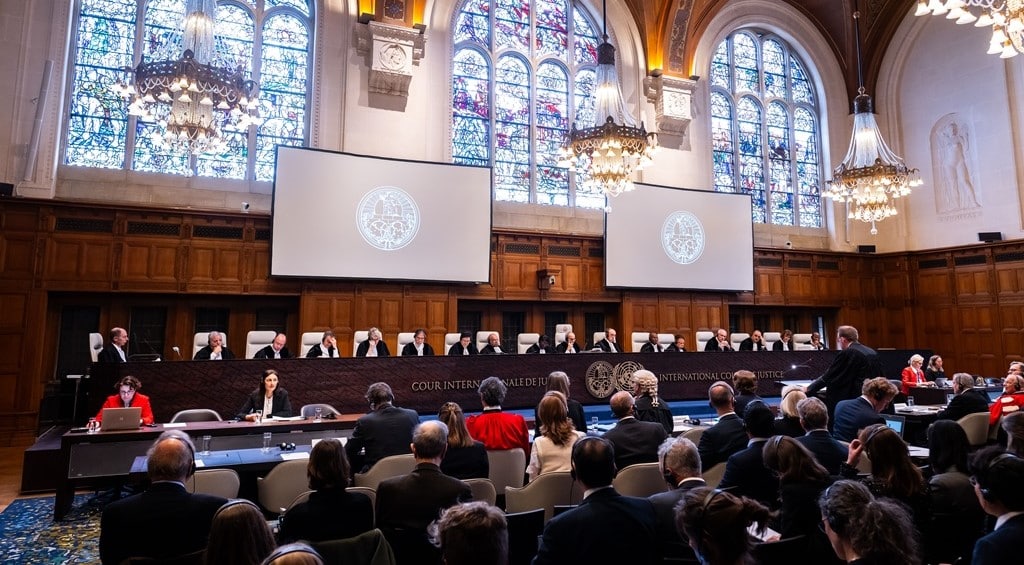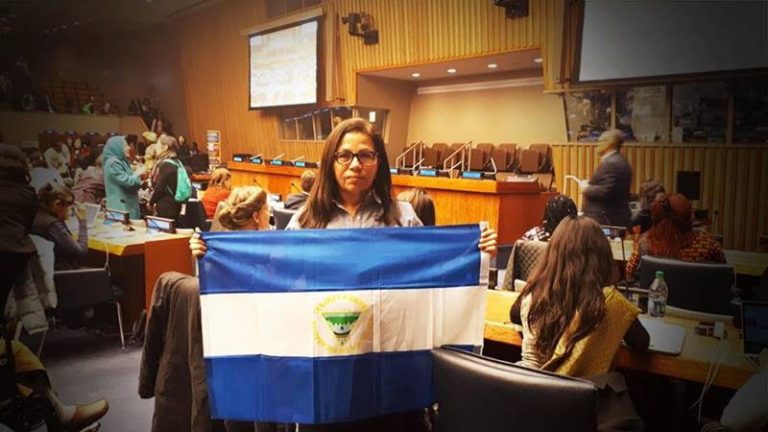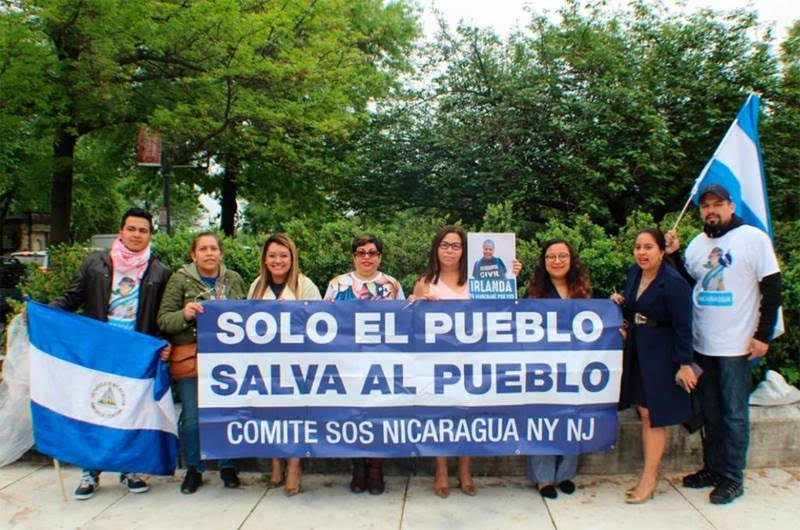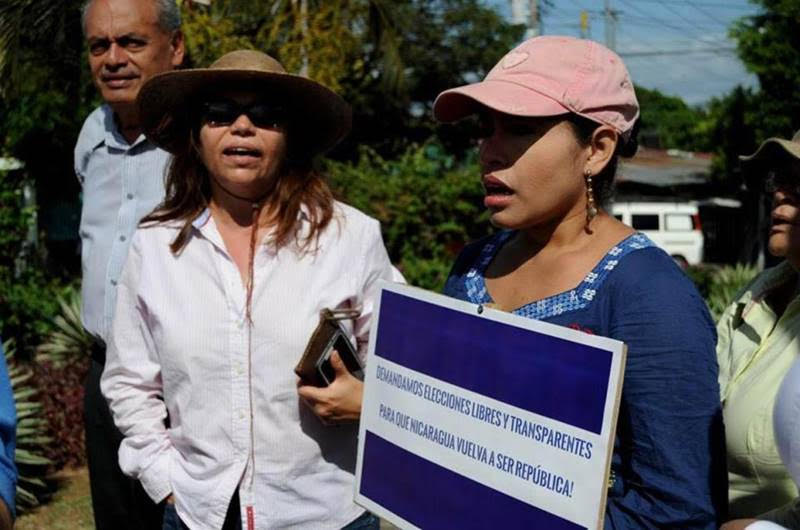11 de mayo 2019

ICJ Rules Against Nicaragua's Request For Germany to Halt Arms Sales to Israel

PUBLICIDAD 1M
PUBLICIDAD 4D
PUBLICIDAD 5D
Human rights defender, Haydee Castillo, brought many to tears during a recent session of the Permanent Council of the OAS.

Haydee Castillo is the president and founder of the Instituto de Liderazgo de Las Segovias (Leadership Institute of Las Segovias) Courtesy | Confidencial
Haydee Castillo wrote the last sentence of her speech five hours before she was to read it during the Permanent Council of the Organization of American States (OAS) session. She was tired, nervous and the hardest moments Nicaraguans have been living through for this last year kept running through her mind.
“I am Haydee Castillo, a defender of human rights. Six months ago, as I was getting ready to board a plane to come to this city to denounce the repression we are suffering, when the Nicaraguan government abducted me at the Augusto Cesar Sandino airport [in Managua] and took me to the El Chipote torture center,” she began reading out loud until she finished reading the five pages she had managed to write very early the morning of April 26th. She then went to sleep and woke up to re-read it a couple of hours before, making sure she didn’t exclude anyone.
“I wanted to write a lot more, however eight minutes places a limit. So it was just a summary of a whole year of pain, a year of hope in four or five pages,” she explains.

Only the people can save the people”. Haydee Castillo has found ways to denounce the Daniel Ortega regime’s human rights violations from her place of exile. Courtesy | Confidencial
Castillo has a long history within the defense of human rights and rights of the Earth. She is the founder and director of an institute promoting leadership in Las Segovias, in northern Nicaragua. Last year, after focusing their work on the civic protests that arose against Daniel Ortega’s regime, persecution against them started until the government finally took away their legal status and confiscated the organization. Now she lives in exile, longing to return to her homeland.
On the 26th of April she had the opportunity to speak, before ambassadors and delegates of the OAS, about the abuses and violations of human rights that forced her to leave the country and the drama of the mothers of those murdered, the people in exile and the political prisoners of Nicaragua. Her words moved many Nicaraguans who were following the transmission through social networks and near the end, heard how her voice broke and her eyes got teary.
“April announced, alongside her women, peasants, indigenous people, the diaspora, the Catholic Church and especially next to her brave youth and students, the planting and harvest of a Nicaragua with dignity and irreverent which leaves dictatorships and wars behind to now emerge as proud volcanoes of freedom and lakes of sovereignty. We will succeed. Nicaragua will once again be a republic. Free homeland and live,” she ended.
When she left the session, many Nicaraguans who live in the United States and travelled that day to stand outside where the session on Nicaragua was happening, hugged her and they all cried together. “It was collective weeping,” she recalls.

On October 15th of last year, Haydee Castillo was arrested and taken to the interrogation cells of El Chipote as she was about to board a plane. Weeks later she had to go into exile. Courtesy | Confidencial
Haydee Castillo never thought that in her life’s history she would have to leave her country secretly, traveling along trails with a backpack on her shoulder. She didn’t do it when she first rose her voice against Somoza’s dictatorship and much less in the 1980s when she fought for the Revolution. But after she left El Chipote there wasn’t a single second of peace in her life.
“I was released because of international pressure, but when I get out, the situation only gets worse. There was no tranquility in any safe house. They would follow me, surround the houses, the police and paramilitaries would come. They would persecute my children. And that is why I had to leave,” she says.
However, she had to flee the country through blind spots because when she was arrested they placed exit restrictions on her because she was being investigated supposedly for breaking the anti-terrorism law, money laundering and for having arms of mass destruction.
“Exile is really another prison. It’s keeping you imprisoned in a prison outside of the country, product of a decision made by the regime which badly governs your country. Exile hurts. Exile breaks down the social fabric of the territory. Exile divides. Exile is carrying many health problems, it creates an emotional imbalance,” she confesses.
For those who flee and leave their families in the country, she says, it is still difficult because all the acts of resistance and denouncement one does against the dictatorship must be well thought out because there are loved ones who are under siege. When she decided to give this speech, she had to talk it over with her husband to take the necessary safety measures.
“It’s hard because one sacrifices their family and sometimes one doesn’t know if they have that right. I say it’s the price we have to pay for defending human rights. I am willing to pay. But one says, in the end time and history puts each one in their place,” she assures.
Archivado como:
PUBLICIDAD 3M
Confidencial es un diario digital nicaragüense, de formato multimedia, fundado por Carlos F. Chamorro en junio de 1996.
PUBLICIDAD 3D